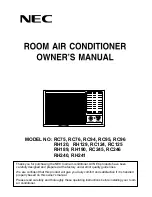
99
AC 198V to AC 264V?
AC 198V to AC 264V?
AC 198V to AC 264V?
DC 12V to DC 16V?
DC 12V to DC 16V?
NO
YES
NO
YES
NO
YES
YES
NO
YES
NO
Check the voltage between S1
and S2 on the terminal block
(TB4) of the indoor unit which
is used to connect the indoor
unit and the outdoor unit.
Check the voltage among R, S and
T on the terminal block (TB1) of the
outdoor power circuit board.
Check the voltage of indoor
controller board (CN2D).
Refer to page 119 and 120.
Check the voltage of the unit after
removing the indoor power board
(CN2S).
Refer to page 118.
Check the voltage between S1
and S2 on the terminal block
(TB1) of the outdoor unit which
is used to connect the indoor
unit and the outdoor unit.
• Troubles concerning
power supply.
• Check the power wiring
to the outdoor unit.
• Check the breaker.
• Bad wiring of the
outdoor controller board.
• The fuses on the outdoor
controller circuit board are
blown.
(FUSE1, FUSE2)
• Check the wiring of the
outdoor unit.
• Check if the wiring is bad.
Check if the fuses are blown.
The fuses on the outdoor
controller circuit board will
be blown when the indoor
/outdoor connecting wire
short-circuits.
(FUSE1, FUSE2)
• Bad wiring of the
outdoor controller board.
• The fuses on the outdoor
controller circuit board are
blown.
(FUSE1, FUSE2)
• Check if mis-wiring, breaking
or poor contact is causing this
problem. Indoor/outdoor
connecting wire is polarized
3-core type. Connect the
indoor unit and the outdoor
unit by wiring each pair of
S1, S2 and S3 on the both
side of indoor/outdoor
terminal blocks.
• Defective indoor
power board
• Replace the indoor
power board.
• Defective indoor
controller board
• Replace the indoor
controller board.
• Mis-wiring, breaking
or poor connection of
in door/outdoor
connecting wire.
• Check if there is mis-wiring
or breaking of wire.
Symptoms: Nothing is displayed on the remote controller
1
Diagnosis flow
Cause
Inspection method and
troubleshooting
LED display of the indoor
controller board
LED1 :
LED2 :
LED3 :
OCT04A-4.qxp 04.9.29 9:17 AM Page 99
















































